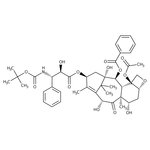Search Thermo Fisher Scientific
Docetaxel, 99%, Thermo Scientific Chemicals
This Thermo Scientific Chemicals brand product was originally part of the Alfa Aesar product portfolio. Some documentation and label information may refer to the legacy brand. The original Alfa Aesar product / item code or SKU reference has not changed as a part of the brand transition to Thermo Scientific Chemicals.
General Description
• Docetaxel is an analog of taxol, and is considered to be a cytotoxic, semisynthetic, second-generation taxane that exhibits antineoplastic, antibiotic, and antimicrotubule activities
• Docetaxel is capable of inhibiting cellular mitosis. This compound promotes the assembly of microtubules from tubulin dimers and stabilizes microtubules by preventing depolymerization. This stability inhibits the normal dynamic reorganization of the microtubule network that is essential for vital interphase and mitotic cellular functions. This results in the persistence of abnormal microtubule structures leading to cell-cycle arrest and cell death
Application
• Docetaxel can inhibit angiogenesis by acting on vascular endothelial growth factor (VEGF) associated with cancer cells
• This compound has been used to investigate the effect of lysosomal autophagic flux in gastric cancer cells
General References:
- Mansour, M.; Ginkel, S.; Dennis, J.; et al. The Combination of Omega-3 Stearidonic Acid and Docetaxel Enhances Cell Death over Docetaxel Alone in Human Prostate Cancer Cells. J Cancer. 2018, 9, (23), 4536-4546.
- Wang, L.; Zi, H.; Luo, Y.; et al. Inhibition of Notch pathway enhances the anti-tumor effect of docetaxel in prostate cancer stem-like cells. Stem Cell Res Ther. 2020, 11, (1), 258.
- Muthu, M. S.; Kulkarni, S. A.; Raju, A.; Feng, S. S. Theranostic liposomes of TPGS coating for targeted co-delivery of docetaxel and quantum dots. Biomaterials 2012, 33 (12), 3494-3501.
- Muthu, M. S.; Kutty, R. V.; Luo, Z., Xie, J.; Feng, S. S. Theranostic vitamin E TPGS micelles of transferrin conjugation for targeted co-delivery of docetaxel and ultra bright gold nanoclusters. Biomaterials 2015, 39, 234-248.



